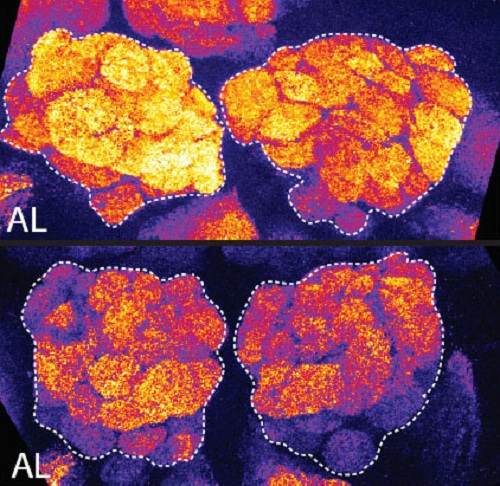Image courtesy of Wikimedia Commons.
Every student has been there—you’ve prepared for a big exam, but when you read over a question, you blank on the correct answer. It isn’t until after you turn in your test that the answer suddenly comes to mind. This is a prototypical example of a transient memory lapse, and neuroscientists at Scripps Research are currently trying to unravel this phenomenon by studying Drosophila melanogaster, or fruit flies.
Led by graduate student John Martin Sabandal, the team from Scripps Research was curious about whether dopamine neurons play a role in modulating the expression of long-term memory. They proceeded to test the effect of stimulating the dopamine neurons in fruit flies and found that memory retrieval was impinged. Sabandal and his colleagues identified a single pair of dopamine neurons, PPL1-?2?’2 in flies, and observed that even though stimulation caused memory suppression, the memory spontaneously recovered within the next hour. Thus, they called this type of forgetting transient forgetting.
Previous research in experimental psychology focused on a tip-of-the-tongue state, in which interfering stimuli or distractors cause a recall failure. In an effort to elucidate the mechanism for transient forgetting, Sabandal and his colleagues modeled this experience in fruit flies. They used classical olfactory conditioning to create an association between a particular odor and an electric shock, which served as a negative reinforcer, and another association between a different odor and the absence of shock. When flies were presented with the two odors, they went to the one that was not paired with a shock. When a distractor, such as blue light or airflow, was applied, the fruit flies forgot these associations. However, the memory was restored within the next hour.
“In nature, when fruit flies are looking for food, they go to a food source, and they rely on prior experiences—or memory—for this behavior,” Sabandal said. “Perhaps they may encounter a predator suddenly or experience gusts of wind, for example, that could distract them and cause transient forgetting. This could, in turn, cause the flies to briefly forget the memory of the food source, and come back at a later time when the memory becomes accessible again.”
Through these experiments, Sabandal and his colleagues determined a pathway through which transient forgetting occurs. In Drosophila, memories are primarily stored in clusters of mushroom body neurons. Within these neurons there exists a dopamine receptor known as DAMB, which is downstream of the PPL1-?2?’2 neuron. When DAMB is functioning normally, it mediates transient forgetting, but when it is mutated, memory is enhanced. These findings demonstrated that DAMB transduces the transient forgetting signal.The implications of this research are far-reaching. Although this particular study looked at olfactory memories in Drosophila, the findings could potentially translate to other types, including visual, auditory, and episodic memories. This research has possible implications in humans, too, with potential contributions to studies about memory enhancement. Ronald Davis, the senior author of the paper, suggests that if a pharmacological inhibitor of this particular forgetting gene can be found, then perhaps memory can be improved. “Understanding the molecular and cellular biology of forgetting is brand new, and there’s an enormous amount to learn in the fly,” Davis said.
Citations: Sabandal, J. M., Berry, J. A., & Davis, R. L. (2021). Dopamine-based mechanism for transient forgetting. Nature. doi:10.1038/s41586-020-03154-y

